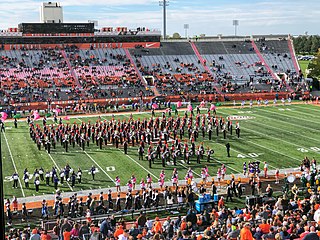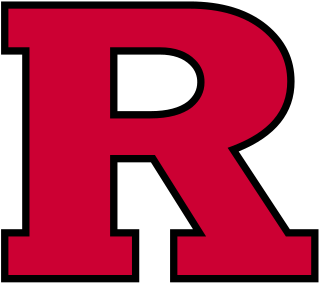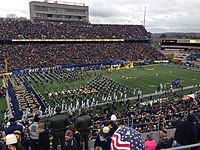
The Solid Gold Sound of the UCLA Bruin Marching Band represents the university at major athletic and extracurricular events. During the fall marching season, this 250-member band performs at the Rose Bowl for UCLA Bruin home football games. Pregame shows by the band aim to build crowd energy and enthusiasm with traditional UCLA songs like "Strike Up the Band for UCLA", "Bruin Warriors", and "The Mighty Bruins". Throughout the game, the band performs custom-arranged rock and pop songs, as well as the traditional fight songs and cheers of the university. The UCLA Varsity Band appears at basketball games and other athletic contests in Pauley Pavilion. In 2018, the Bruin Marching Band was featured on the Muse album "Simulation Theory" performing the Super Deluxe version of the song "Pressure."

The Cavalier Marching Band (CMB) is the marching band at the University of Virginia. The band's original director, William "Bill" Pease, was the first full-time marching band director in the history of the University of Virginia. The Cavalier Marching Band made its debut on September 11, 2004, after a considerable donation was made by University of Virginia benefactors Carl and Hunter Smith to found the band in 2003. The CMB uses a mixture of both DCI-style glide step and Big Ten-style high step in its performances. Of its 200 members, all seven undergraduate schools at the University of Virginia are represented.

The Pride of the Southland Band is the marching band of the University of Tennessee in Knoxville, Tennessee. The band performs at all Tennessee home football games and some away games. The Pride of the Southland is recognized as one of the nation's top collegiate marching bands.

The West Virginia Mountaineers are the athletic teams that represent West Virginia University in Morgantown, West Virginia. The school is a member of National Collegiate Athletic Association Division I. The Mountaineers have been a member of the Big 12 Conference since 2012. The men's soccer team now competes as an affiliate member in the Sun Belt Conference.

The Spartan Marching Band (SMB) is the marching band of Michigan State University. The band has over 300 members and was founded in 1870. Notable music educator Leonard Falcone directed the band from 1927 through 1967.

The Pride of Arizona (PoA) is the marching band and pep band at the University of Arizona. The band was founded in 1902 as the UA ROTC Band and contained 12 members. The band is well-known for their performance at Super Bowl I and the Inaugural Parade of President James Earl "Jimmy" Carter, Jr.
The Pride of Oklahoma Marching Band, known as "The Pride", is the student marching band for the University of Oklahoma Sooners.

The Marching Illini is the marching band of the University of Illinois Urbana-Champaign. The Marching Illini is an organization which annually includes approximately 400 students enrolled in the University of Illinois, and Parkland College. It was founded in 1867 and primarily performs at Illini football games as well as other events around campus.

The West Virginia Mountaineers football team represents West Virginia University in the NCAA Football Bowl Subdivision (FBS) of college football. West Virginia plays its home games at Milan Puskar Stadium on the campus of West Virginia University in Morgantown, West Virginia. The Mountaineers have won or shared a total of 15 conference championships, including eight Southern Conference titles and seven Big East Conference titles. The Mountaineers compete in the Big 12 Conference and are led by head coach Neal Brown.

The Kansas State University Marching Band, also known as "The Pride of Wildcat Land" or just The Pride, is a 375 piece marching band consisting of woodwinds, brass, percussion, color guard, dancers, and twirlers. It is the official band of Kansas State University.

The University of Florida Fightin' Gator Marching Band, also known as The Pride of the Sunshine, is the official marching band for the University of Florida. The current era of the band is also referred to as The Sound of the Gator Nation. They perform at every Florida Gators home football game at Ben Hill Griffin Stadium and also at various other events such as pep rallies, parades, and the annual Orange and Blue spring scrimmage game. A full band usually travels to two away games a year while at other games a small/medium-sized pep band will attend. Members of the Gator Band, as well as other University of Florida students, are encouraged to join other ensembles such as concert band, jazz band, basketball band, and volleyball band. The twirlers for the Gator Band are referred to as the Gatorettes and the color guard is called the Florida Visual Ensemble.

The Marching Jayhawks, is a 380-piece marching band consisting of woodwinds, brass, percussion, and color guard, representing the University of Kansas in Lawrence, Kansas. The band performs at all home football games and occasionally travels to away games. They also send smaller ensembles to pep rallies around the Kansas City area. The band marches in parades on campus and in downtown Lawrence. The volleyball and basketball pep bands play at all home games and will often travel for post-season play.

The Razorback Marching Band is the marching band of the University of Arkansas in Fayetteville, Arkansas. The 300+ member RMB performs at all home football games as well as all post-season play. A small pep band travels to football games played elsewhere.

The Million Dollar Band is the official marching band of the University of Alabama. Founded in 1912, the Million Dollar Band is the largest student organization at the University of Alabama. The band performs during pregame and halftime of every home and neutral-site Alabama football game; it also supplies at least a pep band to every away football game, as well as home men's basketball, women's basketball, women's gymnastics, and volleyball games. In 2003, the band was awarded the Sudler Trophy, recognizing it as one of the top college bands in the United States.
The Georgia Redcoat Marching Band, commonly referred to as "The Redcoats", is the official marching band of the University of Georgia.

The Carolina Band, or the Mighty Sound of the Southeast, is the official marching band of the University of South Carolina. With an average membership of 360, it is the largest ensemble associated with the university's School of Music. The marching band performs at all South Carolina Gamecocks football home games played at Williams-Brice Stadium, as well as neutral site games, bowl games, and all games against Clemson, where both the Carolina Band and Clemson's Tiger Band both perform at half time regardless of which school is hosting on a given year.
The "Pride of Mid-America" is the name of the Ball State University marching band. Consisting of around 200 members, it is the largest student organization at Ball State.

The Pride of the Mountains Marching Band is the marching band which represents Western Carolina University. The band performs pre-game, halftime, and post-game shows at all Catamounts Football home games and routinely provides exhibition performances throughout the Southeast. Unlike most college marching bands, the Pride of the Mountains designs, creates, and performs one perfected halftime show other than doing different performances every week.

The Falcon Marching Band, known also as the FMB, is the marching band of Bowling Green State University. It features a symphonic sound and Big Ten-style chair step marching. Under the direction of Jonathan “Jon” Waters, marching band is the largest student organization on campus. The band performs at all home football games, which are hosted in Doyt Perry Stadium as well as other various university functions.

The Marching Scarlet Knights is the marching band of Rutgers University. The band was founded in 1915 as a small military band, and since then has grown into a 330-member athletic band for the university. The Marching Scarlet Knights performs at all home Rutgers Scarlet Knights football games. The band also travels to select regular season and post season football games.






















